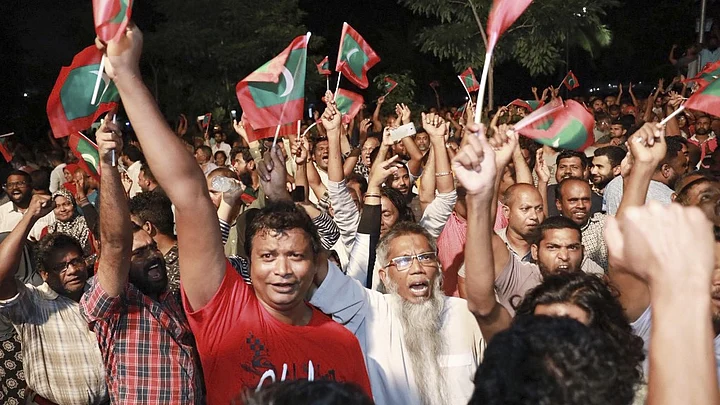The Maldives’ State Health Minister resigned in protest, on 5 February, against the Government sealing off Parliament and refusing to comply with an order of the country’s Supreme Court dismissing cases against exiled President Mohamed Nasheed and MPs of the opposition.
The Maldives’ Supreme Court order on 1 February, the government suspended the country’s Parliament, leading to protests and unrest on the streets of the country’s capital, Male on 2 February.
The Government sealed off Parliament, and deployed armed forces and police around the building on 3 February.
On 4 February, Attorney General Mohamed Anil alleged that the Supreme Court was trying to impeach current President Abdulla Yameen, in a statement to Reuters.
Anil also asked all state institutions and defence establishments to disregard any impeachment ruling by the SC against the president.
Sources within the Maldivian judiciary, however, denied that the court was attempting to impeach President Abdulla Yameen, The Wire reported.
The Wire also reported on 5 January, citing sources within the Maldivian judiciary, that judges had gone into hiding, taking refuge inside the premises of the country’s Supreme Court after receiving death threats.
As domestic and international pressure mounts, the Maldives has delayed complying with a Supreme Court order for the immediate release and new trials of nine Opposition leaders, freeing them to contest presidential elections this year.
On 4 February, more than 100 riot police stood guard outside government offices in Male, including parliament, as well as at Republic Square, a site of protests by opposition activists. The streets, however, were quiet.
On 2 February, Attorney General Anil said he had held discussions with Chief Justice Abdulla Saeed over the administration’s concerns about releasing individuals whose offences ranged from terrorism to corruption and treason.
The Indian Ocean nation has been mired in political unrest since Mohamed Nasheed, its first democratically elected leader, was ousted in 2012. He has been in exile on medical grounds from a 13-year jail sentence on terrorism charges.
The Supreme Court on 1 February said the trials of Nasheed and eight others, many of whom had challenged President Abdulla Yameen, had violated the Constitution and rules of international law. It found that prosecutors and judges were unduly influenced "to conduct politically motivated investigations" against them.
Yameen fired his second police chief in three days and the Opposition said it feared violence as the island nation was pitched deeper into a crisis caused by Yameen's failure to obey a court order to free jailed opponents.
The prosecutor general is currently in the process of examining the cases to determine the best way to proceed with the implementation of the Supreme Court’s ruling, and the prosecutor general will present recommendations at the earliest.Maldives Government’s Statement
An Unexpected Ruling or an Unwelcome Ruling?
The “unexpected” ruling frees opposition leaders to run against Yameen in the presidential poll expected to be completed by October 2018. Convictions on grounds of terrorism would normally bar them from competing unless they received presidential pardons after completing a third of their jail terms.
The joint opposition of the Maldives expressed concern over Yameen’s refusal to abide by the order.
We are deeply fearful that the government’s refusal to implement the Supreme Court order could escalate to unrest and incite violence across the countryOpposition statement
Hundreds of opposition supporters chanted slogans such as "Enforce the Supreme Court ruling," and "Defend the Constitution," in a night rally on 2 February outside the opposition MDP campaign center in Male, the capital.
The United Nations, the United States, the European Union, and India also urged Yameen's government to follow the ruling.
The Secretary-General reiterates his belief in finding a solution to the political stalemate in the Maldives through all-party talks, which the United Nations continues to stand ready to facilitate.The office of UN Secretary-General Antonio Guterres
"We understand the situation is extremely tense," Rupert Colville, a spokesman for the UN High Commissioner for Human Rights told reporters on Friday, 2 February.
The agency was "closely watching how the situation develops in the aftermath of Thursday's decisions by the Supreme Court, and in particular, the reactions of the government, military and police," he added.
The European Union urged the government to hold "inclusive dialogue with the leaders of all political parties that should pave the way for credible, transparent and inclusive elections".
Nasheed, who has been in exile in Britain, had sought U.N. help to restore the political rights of which he was stripped after a trial denounced as hasty and unfair by the United Nations human rights chief.
The decision on Thursday 1 February also nullified a ruling in which 12 lawmakers lost their parliamentary seats for defecting last July from Yameen's ruling party, costing him his majority in the 85-member legislature.
Video Producer: Anmol Saini
Video Editor: Vivek Gupta
(With inputs from Reuters & The Wire)
